How the General Election 2024 conversation evolved from the announcement to voting week
By Phoebe-Jane Boyd, Michael Kane, and Dahye Lee.
Despite the General Election announcement by the Government on a rain-soaked Wednesday evening coming as a complete surprise, the themes and dividing lines that have defined the Conservatives and Labour’s campaigns have not.
While the Conservatives have faced ridicule for their 14-year record, fueling significant anti-Conservative rhetoric across the country, Labour have consistently been questioned on their alleged opaque plans for Government, and what they envision for the future of the country should they take power.
But how has the wider online conversation and press coverage evolved since the first week of campaigning to today? What topics captured the interest of political reporters and the voting public, and which media platforms shaped the narratives?
We analysed the UK General Election 2024 conversation across online and print news, TV, radio, and podcasts as well as X, Threads, Facebook, blogs, and forums, from 23 May – 1 July to examine these fluctuations as we head towards an historic decision for the UK.
Which topics have preoccupied the press and public, now and then?
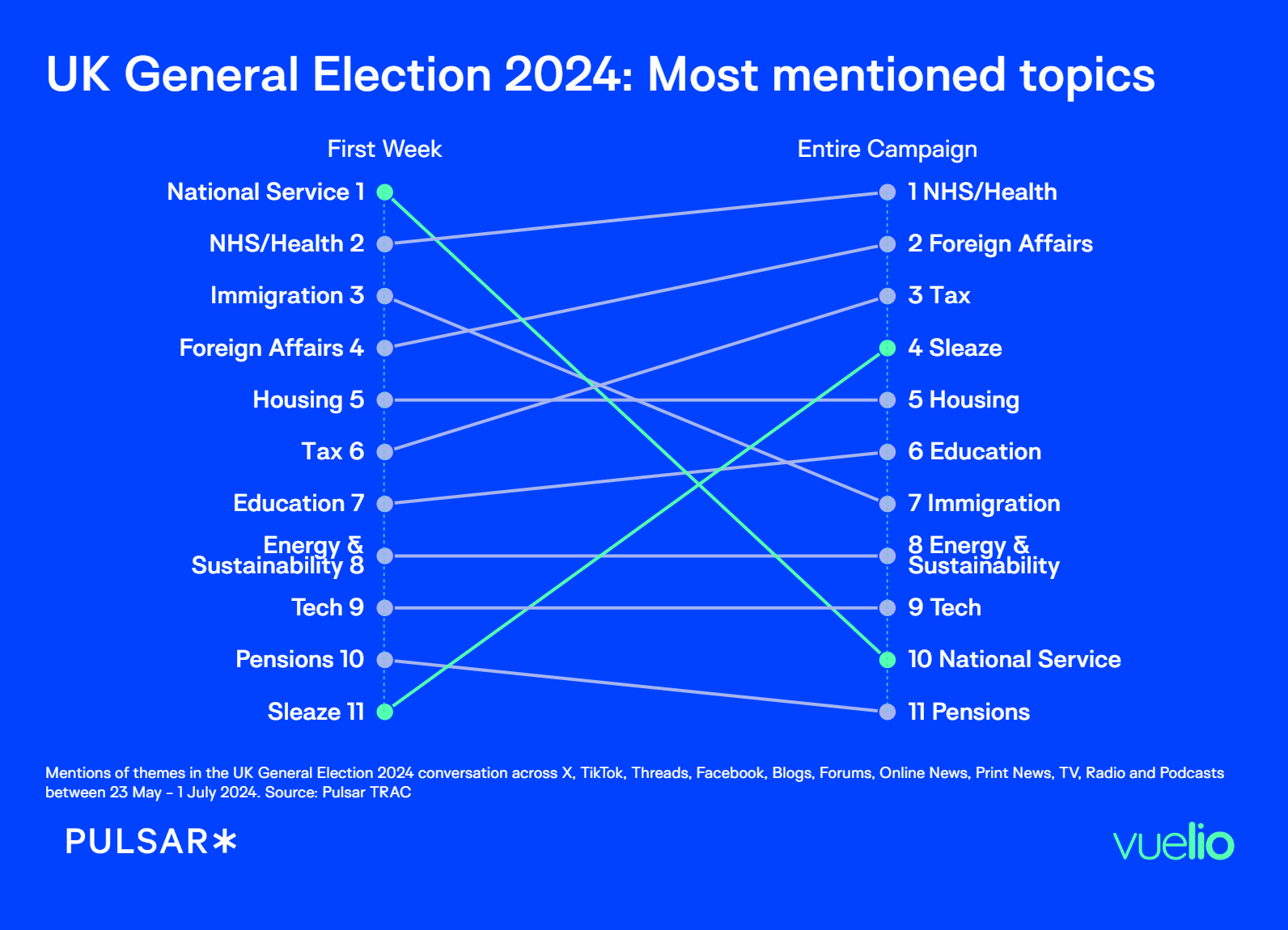
When laying out the top-mentioned topics during this last week against that of 23 – 29 May, conversation around the top ranked has intensified, while the remaining topics have not experienced dramatic changes since the initial General Election announcement.
NHS/Health remains a key consideration, making up 12.6% of discussion over the last week. Natural, perhaps, following major party pledges and public concerns surrounding the state of healthcare following the election.
A topic that started off top of the agenda in the press and on social media and has since fallen out of conversation drastically? Sunak’s National Service idea, which fell by 60%. Controversy has stayed with Sunak, however, with mentions of Sleaze jumping by 80% due to recent gambling scandals. This scandal has also spread to Labour.
While the first leadership debate, hosted by ITV on the 4 June, saw Sunak consistently stressing the ambiguity in Labour’s plans for tax, the junior doctors strikes, and curbing illegal immigration, Starmer focused on a need for Sunak to be ‘ashamed of the last 14 years.’
Flash forward to the last leadership debate hosted by the BBC just last week and the underlying messages remained the same. Sunak ramped up the rhetoric as he urged voters to ‘not surrender’ their pensions, taxes, or borders to Labour. Starmer, again, sought to associate Sunak with the last 14 years of Conservative Government, condemning him as ‘Liz Truss Mark II.’
Labour has managed to hold its lead over the Conservatives in polling, at around 20%, showing the party’s defensive strategy has paid off.
What topics are Labour and the Conservatives each associated with?
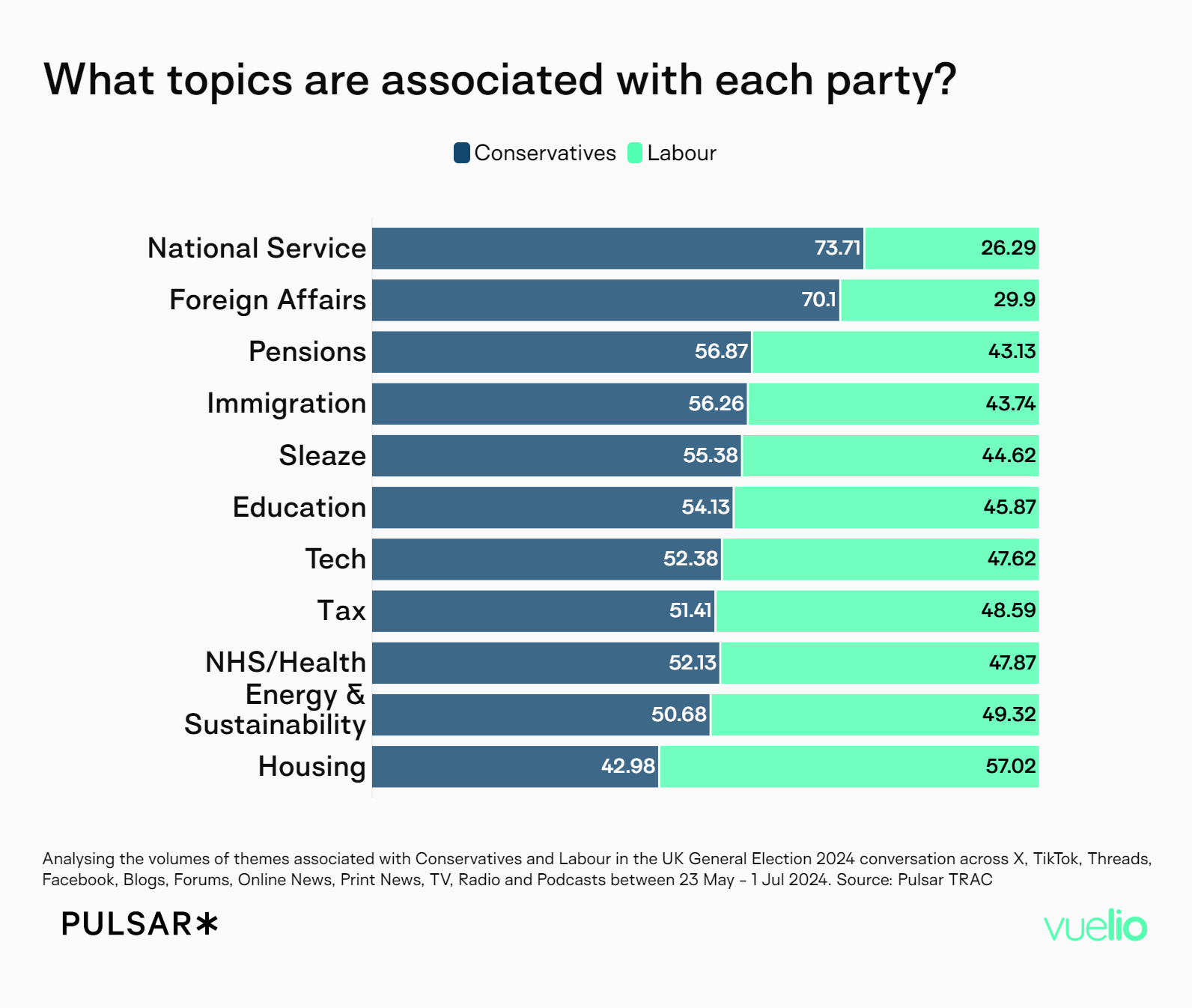
Each party’s associations are shaped by their core political priorities, as shown in the above breakdown of conversation by Conservative and Labour. Conservatives prioritise National Service and Foreign Affairs, consistently scoring above 70, which is partly weighted by public criticism.
Labour has seen an uptick when it comes to housing, with mentions coming from a mixture of audiences – Labour candidates, and supporters of other parties. Yet, these mentions are still less than those from anti-Tory audiences.
Have the media and public been aligned on what matters?
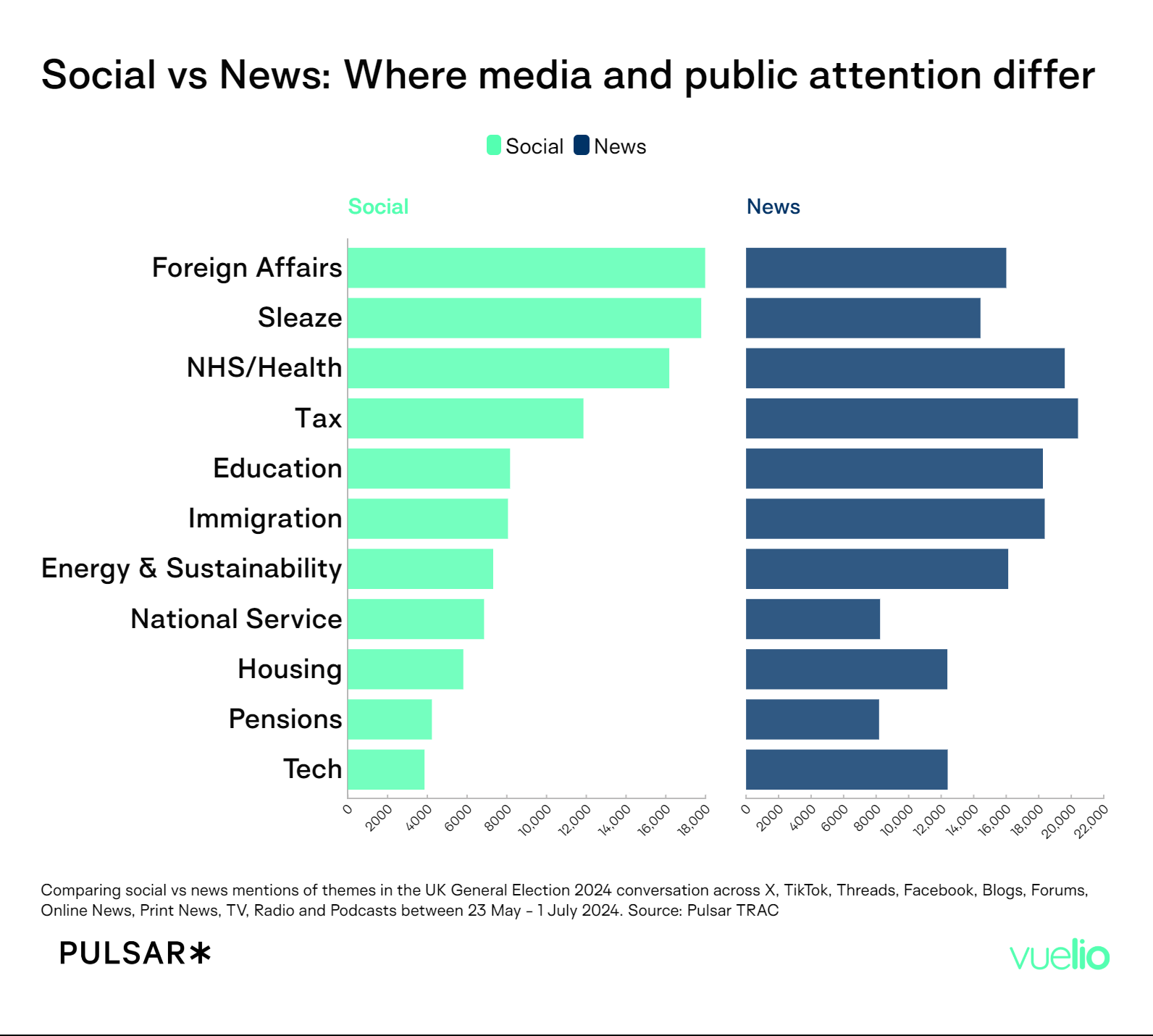
Social and news data breakdown signals how the public and media (mis)aligned on what matters to them.
News coverage has focused on Tax, NHS, and immigration – issues that highlight contentious aspects of major party pledges, from Sunak’s proposed tax hike, to Reform UK’s immigration policies, and Labour’s latest NHS plans.
In contrast, the public’s interest, shown on social media, has focused on Foreign Affairs, Sleaze and the NHS, featuring speculation on Sunak’s early election call, and the growing calls for action from the Government.
Online conversations on the General Election today continue to lean towards news and political events. Channel 4’s TikTok dominance, particularly among young people, highlights its influence.
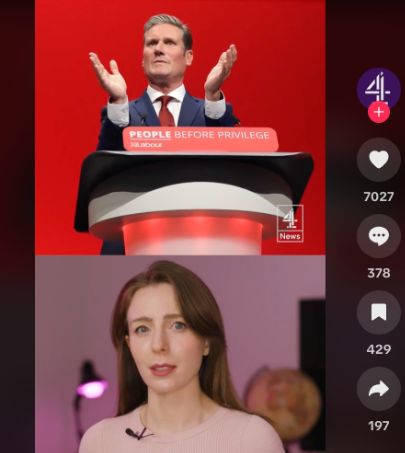
With UK party leaders showing less visibility on TikTok compared to figures like France’s Jordan Bardella – who boasts 1.7M followers – it could be argued that there is less emphasis on populist styles of leadership for the majority of UK political parties.
Where this is markedly different – Reform UK. The party’s burgeoning impact in TikTok dialogues has challenged the traditional discourse dominated by major parties.
In fact, the return of Nigel Farage as leader of Reform UK, alongside Liberal Democrat leader Sir Ed Davey’s campaign stunts and serious focus on social care, has squeezed the incumbent Conservatives from both the left and the right throughout the 2024 General Election campaign.
This has the potential to redraw political boundaries as Farage may finally be elected as an MP in Clacton and the Liberal Democrats may return to become the third largest party in the Commons, removing many Conservatives from the blue wall.
Personality-focused campaigns can project messaging further into new audiences, providing beneficial, and unforeseen, impacts (if not on votes, as Farage has found in previous years, with no election to office).
Which outlets are leading the conversation and coverage now?
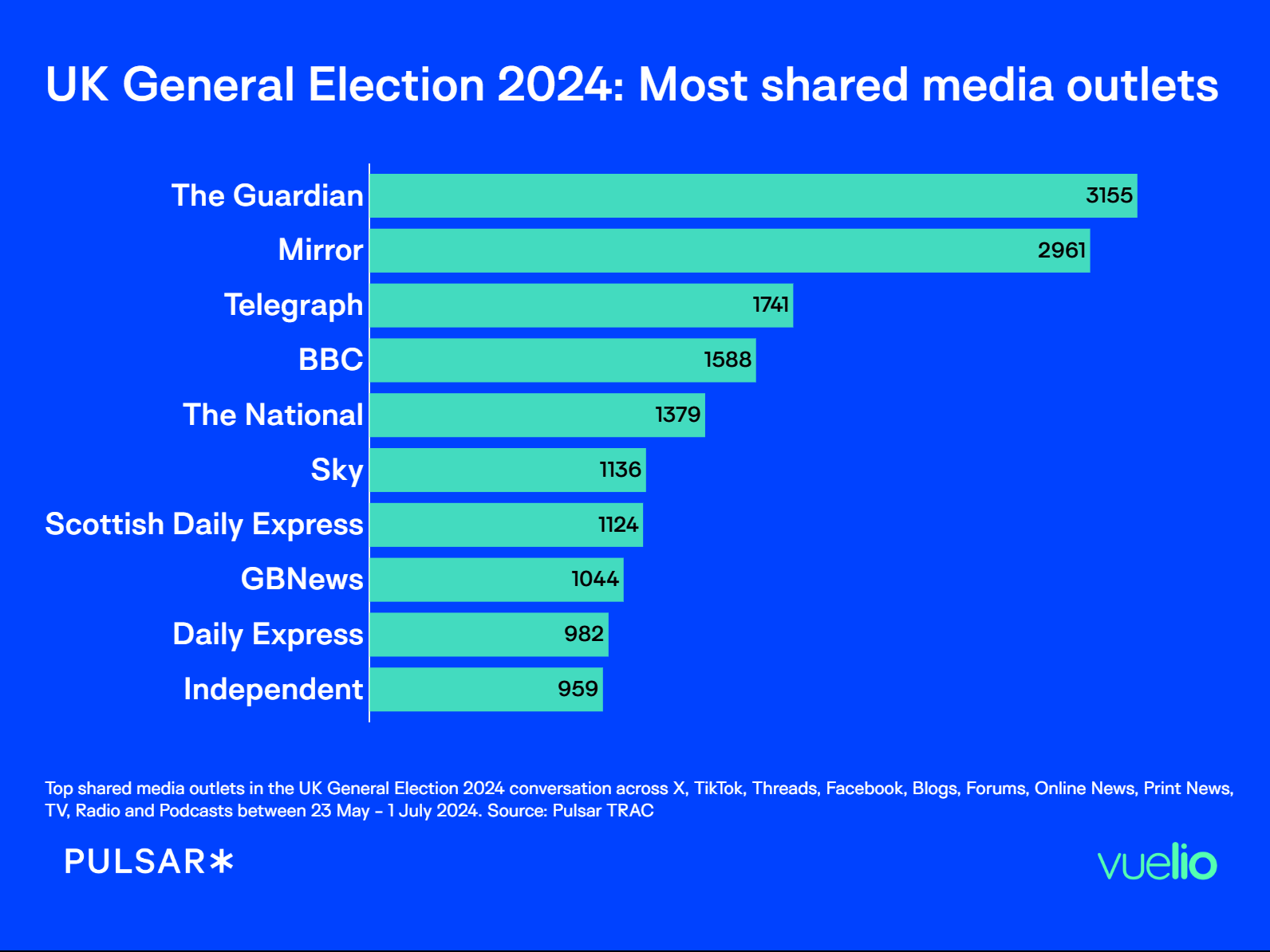
The Guardian and the Mirror emerge as the top-shared media sources among the public – both left-leaning outlets. Notably, people frequently share articles from The Guardian to substantiate their opinions, often using them as evidence in debates.
The most engaged articles focus on questions around the timing of the General Election, and scrutinisation of Sunak’s representation throughout his campaign.
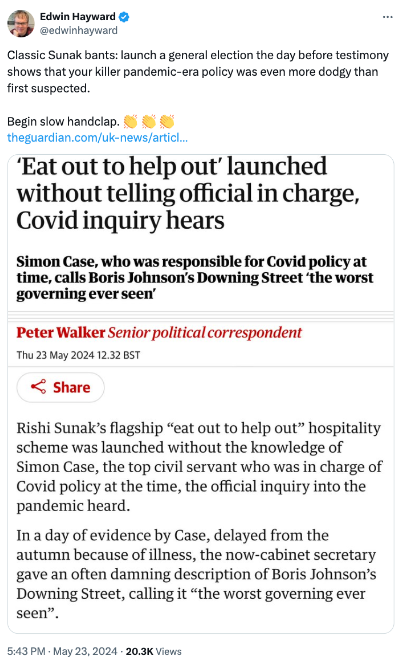
Meanwhile, right-leaning publications such as The Telegraph and GB News, previously outside the top ranks, have also emerged among the top credible sources. This is largely due to the growing social sharing by ex-Tories and Brexiteers who are keenly watching Reform UK’s rising influence.
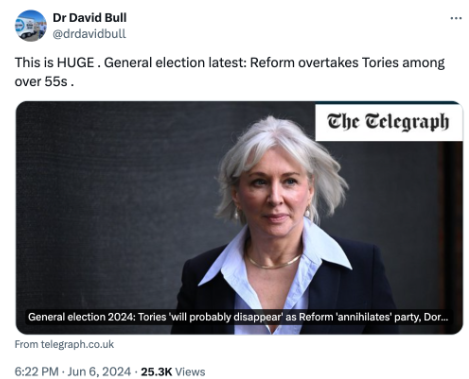
It was only October 2022 that Sunak promised to deliver ‘integrity, professionalism and accountability’ in Government while Starmer has consistently emphasised the importance of returning politics to the ‘service’ of working people. Whether these aspirations materialise after the election is a different question but no one can doubt the importance of this with the last few weeks, and years, in mind.
For regular updates on what is happening in UK politics and public affairs, sign up to our weekly Point of Order newsletter, going out every Friday morning.





Leave a Comment